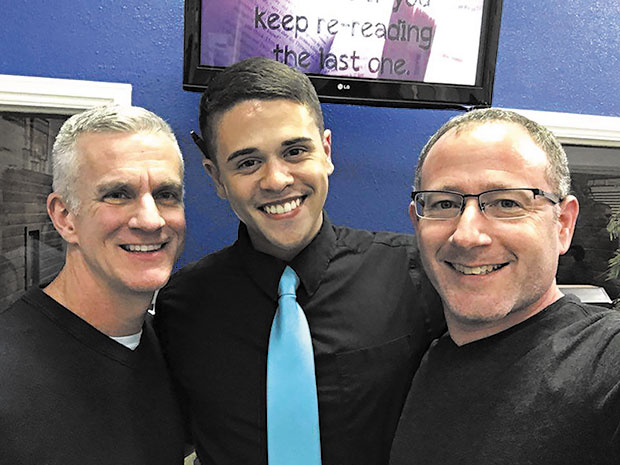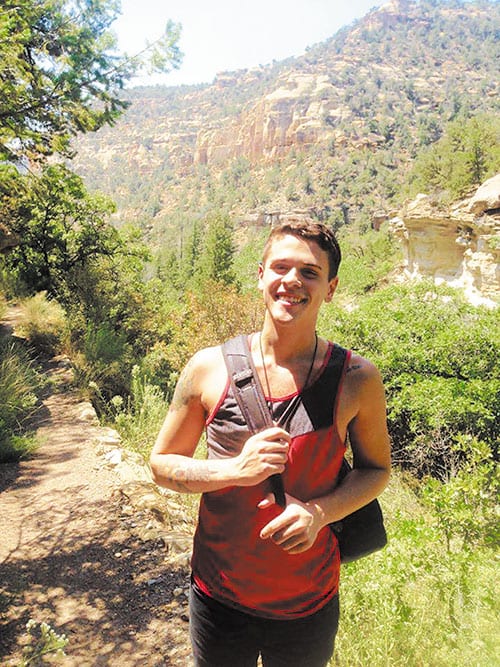Chorale targets meth addiction in LGBT community, other issues in new concert

Turtle Creek Chorale President Gary Kearns, James Parsons and his TCC big buddy Kevin McAda. (Courtesy Turtle Creek Chorale)
DAVID TAFFET | Senior Staff Writer
James Parsons started using meth at age 17. And before long, he said, “It got out of control.”
Then one day in October 2015, he had been up for five days and was severely disoriented. “The last I remember I was having a good time,” he said.
Four days later he found himself handcuffed to a hospital bed.
But from what he’s been told and has been able to put together, at some point he went into a “raged psychosis,” and attacked a couple of people in the house where he was staying. Then he ran outside and down a Dallas street naked, which ended up with him being hit by a car.
For several days he lay unconscious in the hospital. “My skull was split open,” he said. “Horrifying.”
And he was in indescribable pain.
 Although he was handcuffed, no charges were filed. Had they pressed complaints against Parsons, the people he attacked would have faced drug charges themselves.
Although he was handcuffed, no charges were filed. Had they pressed complaints against Parsons, the people he attacked would have faced drug charges themselves.“Anyone would be terrified after that happened,” Parsons said. And for a month-and-a-half he remained clean.
But, “One thing led to another,” he said. “I was doing drugs again. I didn’t realize how little control I had.”
Parsons tried to get sober on his own but couldn’t. He had a job, but was living in his car, and he knew he needed to go into rehab.
“I finally told my family I needed to go,” he said. But rather than go to rehab, he took off in his car. He said he panicked.
His godfather tracked him down two weeks later.
“He convinced me I was acting like an insane person,” Parsons said. He brought Parsons to his first 30-day treatment program.
A year ago this week, he’s been receiving treatment and living at Cenikor, a rehab facility in Fort Worth. He said he has about nine more months to go.
Parsons is a member of the Turtle Creek Chorale. Although he’s not given much freedom to go out, he’ll tell his story at the Saturday, June 3 performance of In Your Dreams at City Performance Hall.
How things change
“How things change,” Chorale Artistic Director Sean Baugh said. “This concert was supposed to be about dreams and dreaming.”
Baugh couldn’t get Parsons’ battle with meth addiction out of his mind and the more he talked about it with other members of the chorus, the more he realized Parsons wasn’t alone.
“This is our AIDS,” he said.
Throughout the AIDS crisis, the chorale was a place of comfort and healing for people living with HIV and for their friends losing their loved ones. More than 150 chorale members died of AIDS.
Now, Baugh sees the meth epidemic in the LGBT community as the new health crisis facing his members.
His concern began with Parsons, the youngest member the chorale had ever had at the time he joined. As he began putting the season’s final concert together, Baugh’s focus changed.
Parsons, Baugh said, is a firecracker. He’s “so talented,” Baugh said. “I had no idea what his other life was.”
Baugh described his creative process in putting together the concert. “Dreams sometimes turn into nightmares, especially for people on the fringes,” he explained. “I was drawn to the reasons people use it and the effect it has.”
As he fleshed out his theme for the concert, he began adding music. One of the people he assigned to play a primary role in this concert told Baugh how important this was to him because he struggled with this addiction in the past. Then other chorale members came forward and discussed their struggle with meth.
With gains in equality, the LGBT community has been afraid to talk about meth, he said, calling it an embarrassment to the community. Baugh realized one of the first steps is to de-stigmatize it. Just as shame was associated with AIDS, getting rid of the shame is the first step in getting help.
Baugh thought about how the chorale can make a difference. He said he hopes people in the audience will say, “Well, the chorale just sang about it. Maybe I can get some help.”
Baugh called this concert a turn for the chorale.
“We’re here to speak to important issues,” he said. Organizations dealing with addiction will be available in the lobby of City Performance Hall after the performances.
Among those organizations that will be on hand will be Cenikor, the residential treatment facility in Fort Worth where Parsons is getting help.
Parsons described his treatment as a behavior modification program. Although he’s been clean for the year he’s been at Cenikor, “it still crosses my mind,” he said. “Urges come over me.”
He needs more practice at normalcy, Parsons said.
As part of his treatment, Parsons works at a call center in Lewisville where he schedules appointments for an air conditioning company. In addition, he has counseling sessions and works on future plans. Once he’s finished his residential treatment, he’d like to go to school to earn a degree in mental health and substance abuse counseling.
“I want to help someone else not make the same mistakes,” he said.
Pam Carnes works in admissions for Cenikor. She said the program is generally 18 to 24 months, and uses behavior modification to “address thinking distortions that justify using” substances.
She described the program as using a holistic approach that includes family programs and classes on life skills and coping skills.
Parsons appears to be on the right track.
“I got my peace of mind back,” he said. “I got my family back.”
The rest of the concert
Meth addiction is only a part of the focus of the concert. It will also include a tribute to the victims of the Pulse massacre a week before the anniversary. They’ll sing
“The Quest Unending,” based on a piece from Ulysses by Alfred Lord Tennyson.
“It’s a classic Turtle Creek Chorale piece,” Baugh said. “A song of resistance from the AIDS days.”
Then, there will be a tribute to the Dallas police officers killed and wounded in an attack in downtown Dallas last summer. The piece was commissioned for the chorale and inspired by the iconic photograph taken by Dallas Voice founder and former publisher Robert Moore.
Moore took the photo while crouching behind a car with officer J. D. Smith, caught in the crossfire. Moore and Smith will attend the Saturday night performance together.
Baugh said that although that attack wasn’t against the LGBT community, we relate to it because people were targeted for who they are. Although the concert approaches very serious themes, Baugh said every piece is hopeful and includes “some of the most beautiful music you’ve ever heard from the chorale.”
…………………
Short term effects:
• Decreases natural feelings of hunger, so users may experience extreme weight loss.
• Disturbed sleep patterns
• Hyperactivity
• Nausea
• Erratic behavior, irritability
• Increased heart rate, blood pressure,
body temperature
Long term effects:
• Increased heart rate and blood pressure
• Damaged blood vessels in the brain that can cause strokes or an irregular heartbeat
• Liver, kidney and lung damage
• Sever tooth decay
• Psychosis
• Depression
Stats:
In 2008, the U.S. government estimated 13 million people have used meth and 529,000 were regular users.
In 2007, 4.5 percent of high school seniors and 4.1 percent of 10th grade students reported having used meth at least once.
Drug overdose deaths involving psychostimulants with abuse potential, which include drugs such as methamphetamine, increased from 5 percent in 2010 to 11 percent in 2015.
This article appeared in the Dallas Voice print edition May 26, 2017.















